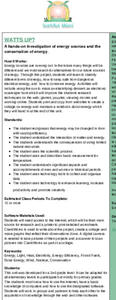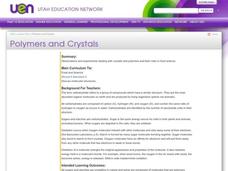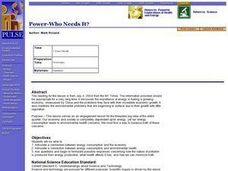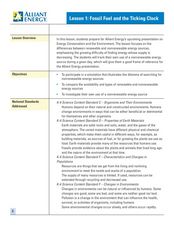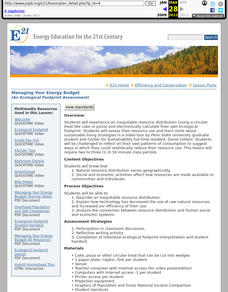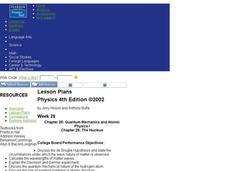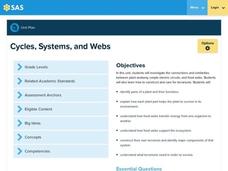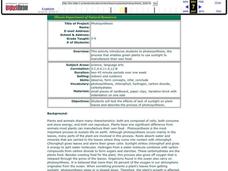Curated OER
To Renew, or Not to Renew
Learners explore the various types of renewable energy. After reading articles, they discover the advantages and disadvantages of renewable energy. They also explore the challenges to switch over to using more and more renewable energy...
Curated OER
Power In Variety
Young scholars discover different types of energy. In this energy source lesson students compare different types of energy, renewable and nonrenewable. Young scholars answer questions about the different types of energy and their impact...
Curated OER
Renewing Our Position
Students engage in a lesson in order to analyze the energy needs of the United States and cover the possible future needs depending on the growth of technology. They cover the alternative energy sources and make presentations of the...
Curated OER
WATTS UP?
Second graders research the Internet as they classify different forms of energy, investigate electrical energy and how to conserve energy.
Chicago Botanic Garden
Introducing Ecosystem Services
Purifying air and water, providing soil in which to grow crops, and moving water through its natural cycle are all services an ecosystem provides that benefit humans. Lesson four in a series lets learners explore and discuss the value of...
American Museum of Natural History
Light Quest
Grab a partner and shed some light on light. A remote learning resource has scholars play a board game to answer trivia questions about light. They also read about how Einstein contributed to the understanding of light as both a wave and...
Curated OER
Water in Earth's Hydrosphere
Environmentalists test stream water for temperature, pH, and turbidity. Each group shares their information and then the class makes an overall evaluation of the water quality. A slide show sets the backdrop for the teaching portion and...
University of Colorado
The Jovian Basketball Hoop
Can you listen to Jupiter on a simple radio? Turns out the answer is yes! The resource instructs scholars to build a simple radio to pick up the radio waves created when the charged particles from the sun hit Jupiter's magnetic...
Curated OER
Polymers and Crystals: Their Role in Food Science
Blend chemistry with cooking in this exploration of polymers, carbohydrates, and food science. Experimenting with gelatin produces concrete examples of the bonding and ploymerization discussed in the lesson. Copious, comprehensive...
Teach Engineering
Designing a Sustainable Guest Village in the Saguaro National Park
Brainstorm ideas to design a sustainable guest village in the Sonoran Desert. The first installment of a nine-part unit teaches young environmental scientists about the basics of the Saguaro National Park and about sustainable design....
Curated OER
Sustainable Marine Fisheries
Through a fishing simulation, environmentalists discover consequences of over fishing. Afterward, they discuss how the activity relates to the impact of real-life commercial fishing. They also consider sustainability in the fishing...
Baylor College
Your Nutrition Needs
It takes some work to ensure you have a balanced diet, but once you know the types of foods that are good for you, it becomes second nature. In the sixth of seven lessons about energy and nutrition, learners create a healthy eating plan...
Curated OER
Solar Matters
Students design an energy resource wheel and demonstrate how to use it to access information about renewable and nonrenewable energy sources.
Curated OER
Who Needs Power?
Students articulate the connection between energy consumption and the global economy. They identify and define the connection between energy consumption and environmental health. Students formulate suggestions concerning how the nature...
Curated OER
Fossil Fuel and the Ticking Clock
Students study energy sources to learn about fossil fuels and environmental concerns. In this energy sources lesson, students watch demonstrations for various energy examples. Students find hidden pennies, make a bar graph on their data,...
Curated OER
Managing Your Energy Budget
Learners experience an inequitable resource distribution and electronically calculate their own Ecological Footprint. The assess their resource use and learn more about sustainable living strategies in a video tour by Penn State...
Curated OER
Quantum Mechanics and Atomic Physics
Students will discuss the de Brogile Hypothesis and state the circumstances under which the wave nature of matter is observed. They will also calculate the wavelengths of matter waves.
Curated OER
Thermal Pollution
In this pollution worksheet, students read about thermal pollution and how hot water affects wildlife. Then students complete 1 short answer question.
Curated OER
All Wrapped Up
Young scholars explore packaging. In this cross-curriculum lesson plan, students bring in samples of food packaging and identify the packaging as natural or manufactured.
Pennsylvania Department of Education
Cycles, Systems, and Webs
Fourth graders review the parts of the plant and their functions. In this plant lesson, 4th graders recognize that plants must transfer energy to make food. Students understand the interdependence of organisms in an...
Curated OER
Photosynthesis
Students are introduced to the process of photosynthesis. In groups, they test the effects of the lack of sunlight on plant leaves and compare the results with their hypothesis. They note the characteristics that plants and animals share...
Curated OER
Recycling-Taking it Easy on the Environment
Students review the garbage/landfill graphs included with the activity. They discuss the information on the graphs and discuss which garbage products come from their homes. Students collect examples of over packaging to share with class...
Curated OER
Commonalities and Differences from Africa to Cleveland as Evidence Through the Gullah Community Connection
Students explore Afro-American history. They identify the commonality between African, Carolinian and Cleveland Black culture. Students explore the water cycle, oceanography, hydrology and bio-geochemical processes. They discuss the...
Curated OER
In Search of Reused and Recycled
Students identify recycled and recyclable products by reading labels. They discuss what happens to solid waste in landfills and its impact on the environment. They discuss ways in which they can conserve natural resources.





